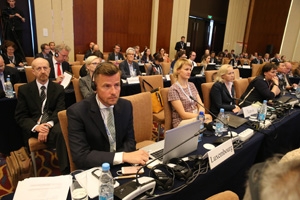Ru
|
Eng
Proposal to postpone decision on Belarus-Lithuania case until next Espoo Convention meeting
16.06.2017

Participants of the high-level Meeting of the Parties to the Espoo Convention suggested postponing the decision on the Belarusian-Lithuanian case, chairman of the general segment of the 7th session of the Meeting of the Parties George Kremlis told the media on 16 June, BelTA has learned.
According to him, a lot of useful discussions were held and important bilateral contacts were established. “Now we are waiting for the decision of the high-level segment of the Meeting of the Parties,” he said. The general segment suggested postponing the final decisions until the next Meeting of the Parties that is due to take place in Geneva in late 2018-early 2019. In his words, this is just a recommendation and the final decision is on the high-level segment. The official stressed that the matter pertains to the decision on all country matters, and not only on the Belarusian nuclear power plant construction.
During the discussion, experts agreed that the existing mechanisms of the Convention are not enough to resolve disputes today, Iya Malkina said. “My colleague George Kremlis said that it is not only the Belarus-Lithuania case. There are also unresolved issues relating to Azerbaijan, Ukraine, and the UK,” she said, stressing that such a proposal of the general segment is an attempt to find a compromise for all parties to the meeting.
The 7th session of the Meeting of the Parties to the Espoo Convention is running in Minsk from 13 to 16 June. Attending the events are nearly 200 representatives from 45 member states of the Espoo Convention, including ministers and deputy ministers, top executives of international organizations, financial institutes, and public associations.
Adopted on 25 February 1991 in Espoo, Finland, the Convention entered into force on 10 September 1997. It has been ratified by 45 states. The document sets out the obligations of the Parties to assess the environmental impact of certain activities at an early stage of planning. It also lays down the general obligation of the Parties to notify and consult each other on all major projects under consideration that are likely to have a significant adverse environmental impact across boundaries.
NEWSWIRE
17.07.2024
02.07.2024
27.06.2024
21.06.2024
19.06.2024
06.06.2024
06.06.2024
06.06.2024
06.06.2024
06.06.2024













